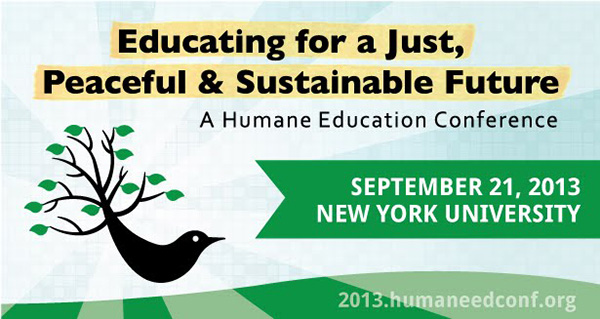
Experts and scholars discussed awareness of animal rights, human rights and treatment of the environment at the NYU’s Animal Studies Initiative’s humane education conference at the NYU School of Law on Sept. 21.
The conference, titled “Educating for a Just, Peaceful & Sustainable Future,” was organized by the nonprofit educational organizations Institute for Humane Education, Humane Education Advocates Reaching Teachers and Roots & Shoots — a youth-focused nonprofit organization.
Zoe Weil, a 52-year-old co-founder and president of the Institute for Humane Education, Jane Goodall, a 79-year-old UN Messenger of Peace and the founder of the Jane Goodall Institute and Arun Gandhi, the 79-year-old grandson of Mahatma Gandhi and founder of the Gandhi Worldwide Education Institute, were the featured keynote speakers.
Weil, one of the first speakers, talked about humane education as a profession.
“More than any other field or profession, educators hold the future in their hands,” Weil said in her address.
She also explained what she hoped to accomplish from the conference, which was held on the same day as the UN’s International Day of Peace.
“I think the best outcome is that the 450 people who are here today leave with tools that they can use to be better humane educators, and that they feel empowered and inspired to help bring this movement to a critical mass,” Weil said. “We really do reach a tipping point where humane education begins to get incorporated into every institution of learning.”
After Weil’s keynote, the director of NYU Animal Studies Initiative, Dale Jamieson, introduced Goodall, who talked about her work with chimpanzees and explained the importance of teachers.
“Teaching is not confined to the teaching profession,” Goodall said in her address. “Children are made to spend too long sitting in class and not enough time going out and learning how we learn best, which is by exploring, by touching, by feeling.”
Tania Goicoechea, who is a second-year master’s students in environmental conservation education at the Steinhardt School of Culture, Education and Human Development, said this conference is a highlight of the events she has attended so far at NYU.
“As environmental conservation students, we got to do several interesting projects,” Goicoechea said. “But this conference is definitely the biggest event [I] have been to so far.”
After lunch the conference participants were divided into smaller groups where they could discuss more specific topics, such as animal issues, sustainability and humane education in schools and communities, with the leaders of the various participating organizations.
Phoebe Hevers, a 37-year-old educator at STEM Launch in Thornton, Colo., said she was looking forward to these breakout sessions because of their applicability to her classroom, as her school participates in Roots & Shoots.
“Part of our school’s goal is to do service learning, and so we are a problem-based learning school,” Hevers said. “We always look for problems within our community and our world that our kids can work on to solve, and then we present it to a panel. Since this is about sustainability and humane education, this is perfect and goes with our next generation science standards.”
Gandhi closed the conference with a speech about his grandfather’s legacy, his personal education and the power of learning, saying that education was about the interconnectedness of the head, heart and hands. He explained how his grandfather’s vision for a more peaceful and humane world has significantly impacted him.
“We must become better than we were yesterday,” Gandhi said in his address.
A version of this article appeared in the Monday, Sept. 23 print edition. Afeefa Tariq and Maria Verbaite are contributing writers. Email them at [email protected].






















































































































































